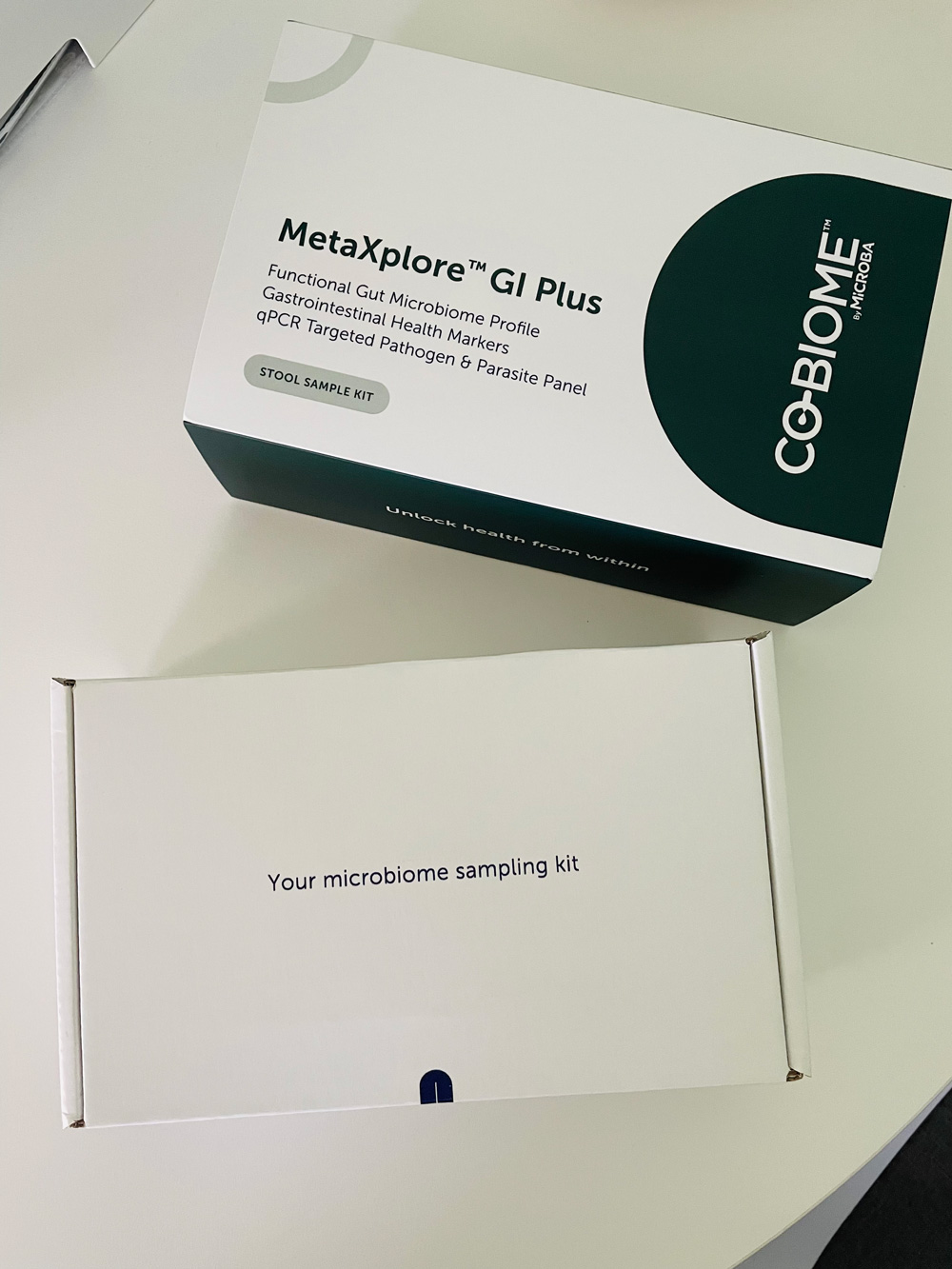Microbiome testing can help you get to the root cause of your bloating, constipation, diarrhoea and cramping, all without the guess work.
It can help give you the insight you’re looking for to help you discover the underlying cause to your ongoing digestive symptoms without spending more money on supplements that your gut may not even need.
From detecting the levels of good and bad bacteria, the presence of leaky gut syndrome, how inflamed your gut is (and why you’re reacting to so many foods!), to understanding how well your microbiome can breakdown fibre, fat and protein it leaves no stone unturned.
Through microbiome testing, you can learn how healthy your digestive system really is, and take some specific and tailored steps towards a healthier digestive system and to ease those unwanted digestive symptoms like abdominal pain, bloating, constipation or diarrhoea (for faster results!).
1. Markers Associated with Bloating, IBS and Constipation
If you’ve been experiencing constant bloating or irregular bowel motions such as alternating constipation and diarrhoea, understanding key negative markers that can impact your digestive health will help to direct your gut treatment.
For example excess production of hydrogen sulfide, a type of gas produced by specific microbes such as Bilophila wadsworthia, is associated with significant bloating, gas (which can smell like cabbage or eggs) and abdominal pain.

If you’ve been experiencing constipation, we will want to look out for a metabolite called methane which is a gas associated with constipation and slow gut motility.
Hexa lipopolysaccharide is another parameter that can be tested via microbiome testing which is a potent toxin produced by gram negative bacteria such as escherichia species (e.coli). If elevated, lipopolysaccharide can cause mucosal inflammation, leaky gut syndrome, and has been linked to type 2 diabetes, low mood, anxiety as well as cognitive impairment such as Alzheimer’s disease.

2. Inflammation Marker causing Abdominal Pain and Cramping
Calprotectin is a crucial marker in microbiome testing that reflects inflammation within the gastrointestinal tract.
Elevated calprotectin levels are often associated with abdominal pain, food sensitivities, and digestive discomfort, as the presence of inflammation can make the gut more reactive to certain foods.
When calprotectin levels are significantly high, it can indicate chronic inflammation and may serve as an early warning sign of inflammatory bowel diseases (IBD), such as Crohn’s disease or Ulcerative colitis.
By identifying elevated calprotectin early, microbiome testing allows us to explore targeted interventions to support gut health and potentially prevent the progression of inflammation-related conditions.

As gut health practitioners we ideally want your calprotectin sitting well and truly below 50. If it comes back between 50 – 100 this can indicate mild – moderate inflammation driven by one or more of the following:
- Food sensitivity such as gluten, casein, eggs, soy or nuts
- A highly processed, inflammatory diet
- Excess alcohol or coffee intake
- Chronic stress increasing inflammation within the digestive system
- A pro-inflammatory bacteria causing damage to your gut wall e.g. e.coli
- Low levels of anti-inflammatory beneficial bacterial species
If your calprotectin marker comes back over 100, this is considered a red flag and you will be referred to your doctor for a colonoscopy to investigate the diagnosis of inflammatory bowel disease such as Crohn’s or Ulcerative Colitis.
Whilst you wait for further investigations your practitioner will continue to work with you through your diet, lifestyle and natural medicines to bring down inflammation in the interim.
3. Do You have Leaky Gut Syndrome?
Leaky gut syndrome is where the lining of the gut mucosal lining starts to break down, allowing undigested food particles, bacteria and toxins to cross the wall of the gut lining into the blood stream.
Leaky gut syndrome has been associated with a number of health conditions such as:
- Irritable Bowel Syndrome
- Allergies, Asthma and Eczema
- Non-Celiac Gluten Sensitivity and Celiac Disease
- Autism Spectrum Disorder
- Autoimmune diseases: IBD, Psoriasis, SLE, Type 1 Diabetes, Rheumatoid Arthritis, Multiple Sclerosis
A marker of leaky gut syndrome is called zonulin and is tested via the microbiome testing that we recommend called Co-Biome.
4. How Anti-inflammatory are your Gut Microbes?
Did you know that your bacteria living in your large intestine produce protective compounds when they break down fibre?
When you eat adequate amounts of fibre, your microbes will ferment this fibre producing a compound called short chain fatty acids which provide great benefits to your digestive health and wellness.
One of the most well researched short chain fatty acids is a compound called butyrate. Butyrate has been shown to provide the following health benefits:
- Reduce inflammation in the gut mucosal lining.
- Maintain the health of your gut barrier, and reducing the risk of leaky gut syndrome.
- Increase your immune defences against infection.
- Maintaining healthy glucose/blood sugar levels, reducing your incidence of diabetes.

If you aren’t eating adequate amounts of fibre and prebiotic rich foods, you won’t be feeding your beneficial bacteria which means you won’t reap the benefits of short chain fatty acids like butyrate.
For long term digestive health, it’s really important to ensure you are eating a wide variety of fibre rich foods and prebiotic foods to enhance your butyrate production.
This all starts with ensuring you have a highly diverse microbiome. For a healthy gut we would like to see your gut microbiome have over 176 species of bacteria. This diversity and richness can only be picked up by one test available in Australia called Co-Biome and is why we recommend this test solely in our clinic to give us the complete picture on healthy your gut microbiome really is.

5. Is Poor Digestion Causing Your Bloating and Gas?
Have you ever felt like you can’t digest red meat, eggs or fatty foods very well? How about raw, fibrous salads? Certain foods might make you feel nauseous or uneasy just thinking about it.
The reason for this aversion could be down to the microbes that you have inhabiting your digestive system. Certain species of bacteria are responsible for breaking down protein, fat and fibre.
Microbiome testing can also provide markers on pancreatic elastase assessing your ability to breakdown carbohydrates, fibrous foods and fat.
If your pancreatic elastase levels are too low it can lead to symptoms such as bloating, excess gas production, or diarrhoea.

Having insights into the type of microbes that live in your digestive system as well as the quality of your digestion, can really help to better understand your digestive health and guide your practitioner to a tailored treatment plan to resolve your unwanted digestive symptoms.
How to Get Started
If you have been struggling with digestive issues for years and you’re wondering what on earth is happening inside your gut, then we highly recommend microbiome testing to most of our patients with long term digestive issues.
This allows us to truly understand the cause without guessing, giving you the opportunity to treat your digestive issues faster and for the long term.
To get started please book an Initial Consultation, or into our Gut Restoration Program.
We can’t wait to support your gut health journey!
Please note that microbiome testing is an additional expense which is paid directly to the chosen laboratory. Payment plans are available through the lab.












